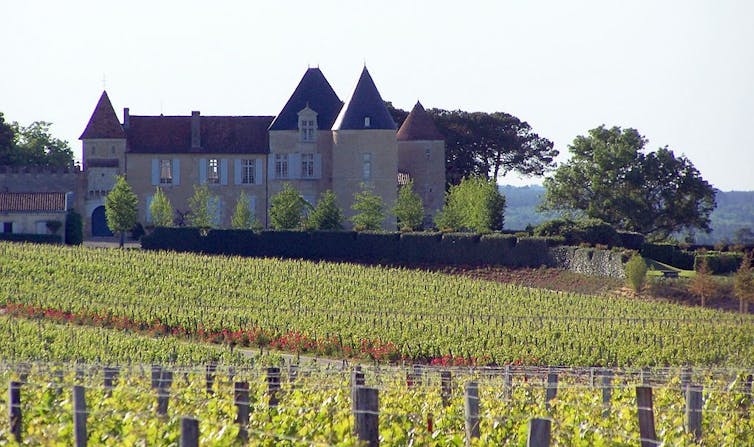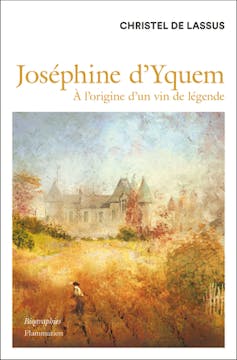How to republish
Read the original article and consult terms of republication.
Joséphine d'Yquem: an entrepreneurial woman of the 19th century and the creator of a legendary wine
By Christel de Lassus, University Professor, Université Gustave Eiffel

Joséphine d'Yquem (1768-1851) transformed a family vine into “Château d'Yquem”, making this Sauternes the very symbol of luxury and the only premier cru supérieur in the 1855 Bordeaux wine classification.
The twists and turns of life placed her, alone, at the helm of the vineyard in France in the first half of the 19th century, when the law allowed little room for women in the business world. Not only did she vigorously defend her land during the Revolution and develop a product of outstanding quality, but she also demonstrated a unique sense of innovation.
Through her strategic choices, she also developed an iconic brand.
The book Joséphine d’Yquem : à l’origine d’un vin de légende (Joséphine d'Yquem: At the Origin of a Legendary Wine), which I recently published with Flammarion, recounts the life of this visionary, who has surprisingly fallen into oblivion. It is based on extensive archives, in particular those of her family, which have been kept for over two hundred years, as well as her writings, annotated account books and correspondence. They emphasise that today she can serve as an example for anyone embarking on an entrepreneurial adventure.
A family of entrepreneurs
Born in 1768, Joséphine came from a family of entrepreneurs. Her father, Laurent de Sauvage d'Yquem, was the sixth generation to work the estate. At the time, it was a mixed farming area, with woods, pine forests, meadows and both red and white grape vines, which was quite common in those days. At the time, the estate's wines were popular with the English and the Dutch, but not very well known in France. More generally, the region was not known for producing great wines.
Her mother, Marthe, had no interest in wine. However, she was very fond of a food that had recently arrived in France, via Bayonne, where she was originally from: chocolate. She introduced her daughter to its bitter flavours at an early age, training her palate and tasting skills.
Laurent d'Yquem was a man who was open to the spirit of the Enlightenment, and wanted to invest in the education of his only daughter. He set about introducing her to the challenges of winegrowing. He was right to do so, as Joséphine, after a happy childhood among the estate's vines, found herself an orphan before the age of 17.
Bereaved and a business owner at 20
Before his death, her father had just enough time to arrange her marriage to their closest neighbour, Louis-Amédée de Lur Saluces, whom she married in June 1785. Her in-laws, the de Lur Saluces family, had powerful protectors at Versailles, and the young couple decided together to make the Yquem name known at the King's court.
This was what we would now call a strategy of influence: by presenting their wine, Joséphine and Louis-Amédée were able to turn influential courtiers into brand ambassadors, a veritable marketing operation. The couple also succeeded in arousing the interest of Thomas Jefferson, ambassador and future president of the United States, during his tour of the Bordeaux vineyards in 1787. In his Travel Diary, he marvelled at the expertise he observed. He ordered some wine, and later had it ordered by the President of the day, George Washington - a very influential man!
When Louis-Amédée died on 29 October 1788, aged 27, after falling from his horse, Joséphine, aged 20 and with two children, found herself alone at the head of the estate. As a widow, she had the right to manage the family business, as she changed her legal status : from “legally submissive woman” to “capable” woman. She demonstrated a strong independence, but also knew how to adapt. When her arguments failed to win someone over, she skilfully emphasised in her letters that she was working in the interests of her son:
« The interests of my minor son can no longer be ignored. »
Confronted with revolutionary fever
During the French Revolution, Joséphine d'Yquem sought to maintain the estate as best she could. She demonstrated a great capacity for discernment, and continued to encourage the teams. Even when arrested, she was able to plead her case by drafting petitions, such as the one dated 24 November 1793, in which she addressed the people’s representatives in Bordeaux:
« The citizen Joséphine d'Yquem informs you, citizens’ representatives, that she has been detained by Mr Sommaire, since 24 Frimaire; that her health for several years has been in the most deplorable state due to the sorrows and misfortunes that she has continued to experience for lack of help and that she is threatened with the most disastrous accidents which would deprive her two still young children of their only support. »
In January 1794, once again arrested and imprisoned, Joséphine d'Yquem went so far as to offer bottles of wine to her accusers. She managed to obtain conditional release, subject to reporting every 10 days to the Bordeaux municipal authorities. Nowadays, we would refer to this as “bribery”.
She was an astute manager, and formed a fine team with her manager, Garros, who provided her with detailed reports several times a week. She wanted to know everything because she was the one who had to make the final decision. This letter from her manager illustrates the point:
« Madam, please tell me what you want done about this and everything else. I'll do what I can. The weather has become so fine that it has helped to ease my fears for the vines. They are in full bloom, you must be feeling relaxed about Yquem... »
A fine nose for innovation
At the head of her company, Joséphine showed a keen sense of innovation, transforming her product, the production method and the commercial outlets.
From the beginning of the 19th century, Joséphine d'Yquem chose to elevate her wine to the highest degree of perfection through artful harvesting. She carefully selected the grapes, aiming to select only those affected by “noble rot” at the expense of quantity. This superb oxymoron expresses the contribution of botrytis cinerea, the microscopic fungus that transforms grape juice into a sweet wine.
Today, this “commercial positioning” strategy would be welcomed. With morning mists and plenty of sunshine, the estate's climate proved ideal for ripening. Yquem was transformed, thanks to its director, into a wine with exceptionally well-developed aromas, until it became a rare wine that is now one of the most famous in the world.
In 1826, Joséphine once again demonstrated her sense of strategy by building a dedicated cellar. This was a real transformation and modernisation of the business: Château Yquem went from being a wine producer to ageing wines. A genuine business transformation.
She was also able to find new outlets, with foreign customers but also, in a truly innovative way, by appealing to new customers such as upmarket restaurant owners. Étienne Chabot, Jean-François Potel's partner with whom he reinvented the catering profession, was one of the first customers on this network.
A renowned strategist
Joséphine d'Yquem also proved her talent for implementing a genuine marketing strategy and developing effective communication for her product. To highlight its excellence and to develop sales by the bottle, she designed a label with “old gold” typography, which remains virtually unchanged today. It was also she who improved the bottle, about which François Mauriac once said:
« The summers of yesteryear burn in the bottles of Yquem. »
Joséphine d'Yquem also paid particular attention to customer relations. She responded to each customer personally and adopted loyalty-building techniques. Customers were delighted and made repeat orders. One of them, with great confidence, wrote to her, for example:
« Allow me, Madam, to express my sincere thanks and to ask you for preference, if there is still time, for the ‘98 harvest of Sauternes wine at 456 pounds per barrel. »
She ran the company until passing it on to her grandson Romain Bertrand de Lur Saluces. She died in 1851. In her will, we can see how thoughtful she was towards everyone, but also how careful she was not to leave too many personal documents, as if she was trying to control her image.
Four years later, her many innovations received posthumous recognition in the 1855 wine classification, which Napoleon III wanted for the Universal Exhibition that same year. Château d'Yquem was the only Bordeaux white wine to be classified as a « Premier Cru Supérieur ».
Alcohol abuse is dangerous for your health; it should be consumed in moderation. Alcohol should not be consumed by pregnant women..
Identity card of the article
| Original title: | Joséphine d’Yquem : femme entrepreneure du XIXᵉ siècle à l’origine d’un vin de légende |
| Author: | |
| Publisher: | The Conversation France |
| Collection: | The Conversation France |
| License: | This article is republished from The Conversation France under a Creative Commons license. Read the original article. An English version was created by Hancock & Hutton for Université Gustave Eiffel and was published by Reflexscience under the same license. |
| Date: | October 6th, 2023 |
| Langages: | French and english |
| Keywords: | wine, communication, innovation, marketing, strategy, luxury, French Revolution, women entrepreneurs, biography, company(ies) |


![[Translate to English:] Licence creative commons BY-SA 4.0 [Translate to English:] Licence creative commons BY-SA 4.0](https://reflexscience.univ-gustave-eiffel.fr/fileadmin/ReflexScience/Accueil/Logos/CCbySA.png)